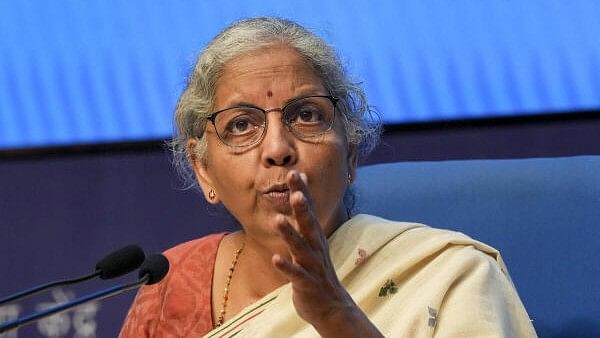
Union Finance Minister Nirmala Sitharaman.
Credit: PTI Photo
The Bharatiya Janata Party (BJP) has fielded several of its Rajya Sabha members and ministers in the Lok Sabha elections this time. They include Piyush Goyal, Bhupender Yadav, Rajiv Chandrasekhar, Mansukh Mandaviya, and Jyotiraditya Scindia. Finance Minister Nirmala Sitharaman was likely asked to contest either from Tamil Nadu or from Andhra Pradesh. She has backed out despite the BJP showing keenness that Upper House members ‘prove their mettle’ with the electorate.
In 2009, veteran BJP leader L K Advani, then Leader of the Opposition, had also asked three close lieutenants, members of the Rajya Sabha and the party’s rising stars to contest the Lok Sabha elections; only Sushma Swaraj agreed to contest. One cited extreme diabetes, and the other requested Advani to publicly declare that he wanted him to focus on party work! Both went on to become powerful ministers under Modi. One even occupied a high constitutional position.
Sitharaman then, is not the first BJP Rajya Sabha member to cop out. However, unlike her predecessors, she will opt out of a position of power. Before she was finance minister, she held the defence and commerce portfolios. Lack of funds is a poor excuse. Had Sitharaman declared her candidature, corporates would have lined her campaign chest. Her party is the largest recipient of electoral bonds — getting several hundred times more than the second-place holder, the Congress. Surely a large part of her election campaign would have been funded by her party.
Her lame excuse also does a great disservice to other Lok Sabha candidates, by suggesting that they are moneybags and that elections cannot be contested even on a minister’s salary. Then, are the campaign funds of those contesting not kosher?
The more likely reason for her to withdraw from the Lok Sabha contest is that she offered constituencies in either Tamil Nadu or Andhra Pradesh. She thought she was unlikely to win from either state.
South India is not favourable ground for the BJP, outside of Karnataka. Sitharaman’s home state is Tamil Nadu where the BJP does not have a strong alliance with former partner AIADMK. So, no constituency in Tamil Nadu will guarantee her victory.
Nor would Andhra Pradesh have been easy for Sitharaman, although she married into an Andhra family. She would have to face uncomfortable questions about her husband, political economist Parakala Prabhakar, a trenchant critic of the Narendra Modi government’s economic policies.
He is the author of a highly acclaimed book about the Modi regime, ‘The Crooked Timber of India: Essays on a Republic in Crisis’ and loses no opportunity to take on the government. Sitharaman’s adversaries would not have missed an opportunity to use Prabhakar’s critique of the economy, which is her charge. Such collateral personal issues would unnecessarily bring her into controversy without assuring a victory.
The safest seat for her would have been the Brahmin-dominated constituency of Bangalore South where Sitharaman’s mother resides. It is a pocket borough of the BJP, from which even Nandan Nilekani lost as Congress candidate in 2014 to Ananth Kumar, despite his popular public persona. However, moving the incumbent BJP MP, Tejasvi Surya from Bangalore South would have been out of the question. The Hindutva family has plans for the national ascendancy of this budding Hindutva leader.
Nor could she have contested from any seat in North India. Although she can speak Hindi, her manner is brusque and lacks the colloquiality to win votes in the Hindi heartland.
With no safe seat on the horizon and four more years to go of her Rajya Sabha term, there is no ostensible reason for her to erode her image by losing an election. However, the needless histrionics about inadequate funds holding her back may affect her political future after the general elections. She will continue to be in the Rajya Sabha, but it is doubtful that she will be in Modi’s Cabinet, if his government is re-elected.
Sitharaman was inducted into the Cabinet along with Smriti Irani in 2014 in Modi’s first Council of Ministers. Many political observers saw this as an attempt to counter the powerful persona of Sushma Swaraj who had an uneasy relationship with the new prime minister. Ten years later, Modi has accrued so much power that he faces no such constraints. No questions will be asked if he appoints new faces as is apparent from the greenhorns he recently made chief ministers in Chhattisgarh, Madhya Pradesh, and Rajasthan, throwing veteran claimants aside.
The practice of the BJP has been that those who have been given an initial breakthrough nomination should contest elections. This was at the root of some rumours that S Jaishankar might contest from the New Delhi constituency. But that conjecture fizzled out after his name was missing from the candidate list announced by the party, for Delhi.
Will ministers like Jaishankar and Petroleum and Urban Affairs Minister Hardeep Singh Puri from the Upper House also throw up their hands taking the cue from Sitharaman? Jaishankar still has five years and Puri has two years of their Rajya Sabha tenures. Puri had contested unsuccessfully in 2019 from Amritsar. Jaishankar is yet to wet his feet. Still, both enjoy the advantage of being professionals who were inducted into the party for their skills. Nor have they spoken out of turn on the subject of contesting elections. Sitharaman has none of these advantages.
(Bharat Bhushan is a Delhi-based journalist)
Disclaimer: The views expressed above are the author's own. They do not necessarily reflect the views of DH.